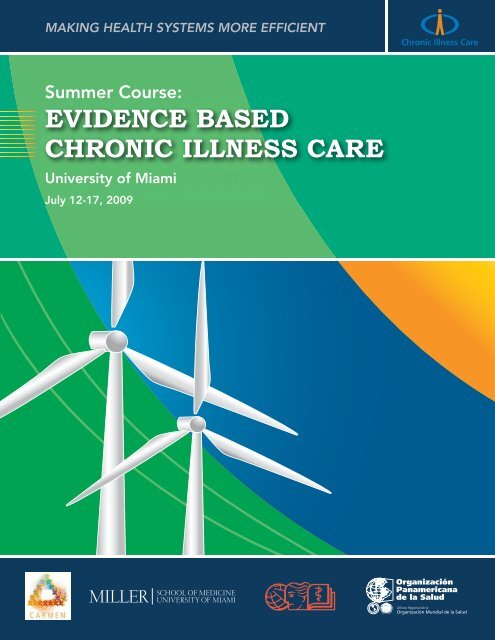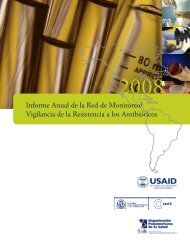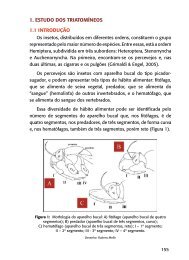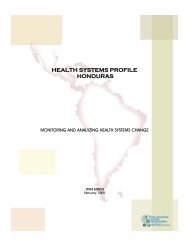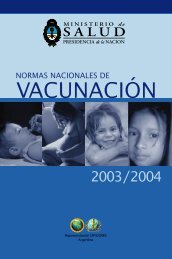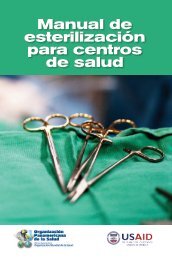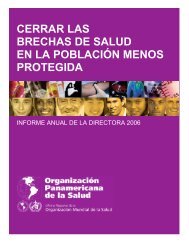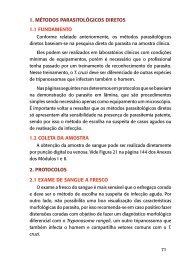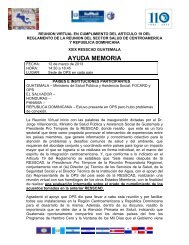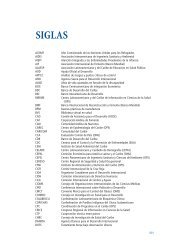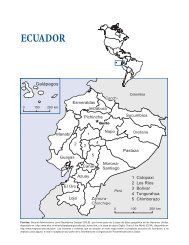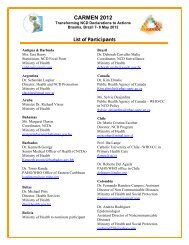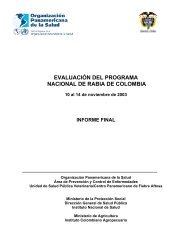EVIDENCE BASED CHRONIC ILLNESS CARE - PAHO/WHO
EVIDENCE BASED CHRONIC ILLNESS CARE - PAHO/WHO
EVIDENCE BASED CHRONIC ILLNESS CARE - PAHO/WHO
You also want an ePaper? Increase the reach of your titles
YUMPU automatically turns print PDFs into web optimized ePapers that Google loves.
MAKING HEALTH SYSTEMS MORE EFFICIENT<br />
Summer Course:<br />
<strong>EVIDENCE</strong> <strong>BASED</strong><br />
<strong>CHRONIC</strong> <strong>ILLNESS</strong> <strong>CARE</strong><br />
University of Miami<br />
July 12-17, 2009
Graduate Program in Epidemiology and Public Health<br />
University of Miami Miller School of Medicine<br />
<strong>EVIDENCE</strong> <strong>BASED</strong> <strong>CHRONIC</strong> <strong>ILLNESS</strong> <strong>CARE</strong><br />
July 12-17, 2009<br />
Alberto Barceló<br />
Textbook:<br />
ICIC: Improving your Practice Manual<br />
http://www.improvingchroniccare.org/downloads/icic_improving_your_practice_manual.doc<br />
Course Website:<br />
http://new.paho.org/hq/index.php?option=com_content&task=view&id=1546&Itemid=259&lang=en<br />
http://new.paho.org/hq/index.php?option=com_content&task=view&id=1546&Itemid=259&lang=es<br />
COURSE E-MAIL ADDRESS<br />
cronicare@paho.org<br />
Webcast:<br />
https://portal.paho.org/sites/Elluminate/ATab2.aspx?CalendarDate=2009-07-1&CalendarPeriod<br />
=month&View={12C10EDC-08A9-4CFD-9E2B-373BEA3D6F82}<br />
Distance Education Site:<br />
the <strong>PAHO</strong> Virtual Campus http://devserver.paho.org/virtualcampus/moodle/course/view.<br />
php?id=24<br />
Credits (for UM students): 3 (EPH 584. Special Topics: Evidence Based Chronic Illness Care)<br />
Contact Person at University of Miami:<br />
Lacey Greathead<br />
Sr. Administrative Assistant for the Graduate Programs in Epidemiology & Public Health<br />
University of Miami, Leonard M. Miller School of Medicine<br />
Clinical Research Building<br />
1120 NW 14th Street, Suite 1066<br />
Miami, FL 33136<br />
Phone: 305.243.5851 I Fax: 305.243.5544<br />
LGreathead@med.miami.edu
MAKING HEALTH SYSTEMS MORE EFFICIENT<br />
SUMMER COURSE: <strong>EVIDENCE</strong> <strong>BASED</strong> <strong>CHRONIC</strong> <strong>ILLNESS</strong> <strong>CARE</strong><br />
Contents<br />
Introduction<br />
Objective<br />
Course Summary<br />
Course Director<br />
Faculty FROM<br />
Guest Lecturers<br />
COURSE LEARNING OBJECTIVES<br />
COURSE REQUIREMENTS<br />
GRADING<br />
The Chronic Care Model<br />
Resources<br />
Class Schedule<br />
Annex 1 Tips for writing critical review of journal arcticles<br />
Annex 2 PROPOSAL FORMAT<br />
Annex 3 The Miami Metrorail System Map<br />
Annex 4 COURSE APPLICATION FORM<br />
Annex 5 Formulario de Solicitud dEL CURSO<br />
2
MAKING HEALTH SYSTEMS MORE EFFICIENT<br />
SUMMER COURSE: <strong>EVIDENCE</strong> <strong>BASED</strong> <strong>CHRONIC</strong> <strong>ILLNESS</strong> <strong>CARE</strong><br />
Introduction<br />
The CARMEN School announces the course Evidence Based<br />
Chronic illness Care (EBCIC) that will take place at the University<br />
of Miami, Florida, July 12-17, 2009. This course is a collaboration<br />
between the Unit of Non Communicable Diseases<br />
from the Pan American Health Organization and the Department<br />
of Epidemiology and Public Health of the Miller School<br />
of Medicine at the University of Miami. The course is appropriate<br />
for health professionals involved with chronic disease management<br />
and quality of care at different levels of the public<br />
health system. The present course is a condensed version of<br />
the EBCIC offered as a one week summer course. A detailed<br />
description of EBCIC is presented in Annexes 1-3.<br />
Objective<br />
To provide scientific evidence to reorient the primary care systems<br />
to better address the chronic disease pandemic.<br />
Course Summary<br />
Evidence-Based Chronic Illness Care will introduce students<br />
to ways in which health systems can be reoriented to better<br />
manage chronic conditions such as diabetes, cardiovascular<br />
diseases, cancer and chronic obstructive pulmonary disease.<br />
This topic is of pressing concern to health systems around<br />
the world as life expectancy and exposure to risks for chronic<br />
health problems rise. Students will learn about health care<br />
models that synthesize essential aspects of chronic disease<br />
management, including components within the organization<br />
of the health system (multidisciplinary teams, provider decision<br />
support, clinical information systems, and patient selfmanagement<br />
support), community services and linkages, and<br />
public health policies and financing mechanisms. State-ofthe-art<br />
evidence and best practices for chronic disease management<br />
will be reviewed, and remaining knowledge gaps<br />
will be identified. Emphasis will be placed on populationbased<br />
strategies and their application in different scenarios,<br />
including low-resource settings and developing countries.<br />
The course integrates the perspective and experience of the<br />
World Health Organization in public health aspects of chronic<br />
diseases in low- and middle-income countries, particularly in<br />
the Americas. This program is a collaboration between the<br />
University of Miami and the Pan American Health Organization,<br />
and it is part of the CARMEN School.<br />
Place<br />
University of Miami, Clinical Research<br />
Building, Room 988, 1120 NW 14 St,<br />
Miami, FL 33136.<br />
Schedule<br />
(Registration) 17:00-20:00 Sunday<br />
July 12, 2009<br />
(Course) Monday-Friday 8:30-17:00<br />
Accommodation<br />
A group of rooms will be blocked at<br />
Marriot Miami Dadeland, 9090 S<br />
Dadeland Blvd, Miami, FL 33156<br />
http://www.marriott.com/hotels/travel/miadd-miami-marriott-dadeland/<br />
The Miami metrorail system connects<br />
Dadeland to the UM Campus<br />
at the Jackson Memorial Hospital<br />
area, where the course takes place.<br />
The ride takes around 25 minutes.<br />
Tokens to access the metrorail are<br />
available at the metrorail station<br />
machines for the price of US$2.00.<br />
The nearest stop to the University of<br />
Miami is Civic Center (The Metrorail<br />
System map appears in Annex 4).<br />
http://www.miamidade.gov/transit/<br />
metrorailstations.asp<br />
Scholarship<br />
<strong>PAHO</strong> will offer a limited number of<br />
scholarships. The scholarship will<br />
cover accommodation and per diem.<br />
An application form is attached in<br />
Annex 5. The selection of candidates<br />
will be based on the answers to the<br />
application form questions, as well<br />
as the relevance of the course to the<br />
applicant and the potential for the<br />
applicant to utilize the course contents<br />
in their area of work.<br />
Deadlines<br />
The deadline for application for<br />
scholarship is June 10, 2009. The<br />
deadline for course registration is<br />
June 15, 2009, but may be opened<br />
while space is available.<br />
Certification<br />
A certificate of participation from the<br />
Pan American Health Organization will<br />
be provided at the end of the course.<br />
Language<br />
English-Spanish and Spanish-English<br />
translation will be available. All readings<br />
are available in English only.
MAKING HEALTH SYSTEMS MORE EFFICIENT<br />
SUMMER COURSE: <strong>EVIDENCE</strong> <strong>BASED</strong> <strong>CHRONIC</strong> <strong>ILLNESS</strong> <strong>CARE</strong><br />
Introducción<br />
La escuela CARMEN ofrece el curso Manejo de Enfermedades<br />
Crónicas Basado en Evidencias (MECBE) que tendrá lugar en la<br />
Universidad de Miami, 12-17 de Julio de 2009. Este curso es una<br />
colaboración de la Unidad de Enfermedades No Transmisibles<br />
de la OPS y el Departamento de Epidemiología y Salud Pública<br />
de la Escuela de Medicina Miller de la Universidad de Miami. El<br />
curso es apropiado para los profesionales de la salud encargados<br />
de la atención a las enfermedades crónicas y de su calidad en los<br />
diferentes niveles del sistema de salud pública. El presente curso<br />
se una versión condensada de MECBE y se ofrece como curso<br />
de verano de una semana de duración. La descripción completa<br />
de EPH-MECBE aparece en los anexos 1-3.<br />
Objetivo General<br />
Proveer evidencias científicas para la reorientación del sistema<br />
de atención primaria para enfrentar el nuevo desafío de la pandemia<br />
de enfermedades crónicas.<br />
Resumen del Curso<br />
Manejo de Enfermedades Crónicas Basado en Evidencias presenta<br />
a los estudiantes el modo de reorientar los sistemas de<br />
salud para prestar una mejor atención a las enfermedades crónicas<br />
tales como la diabetes, las enfermedades cardiovasculares, el<br />
cáncer y la Enfermedad Pulmonar Obstructiva Crónica (EPOC).<br />
Este tópico es de vital importancia para los sistemas de salud a<br />
nivel mundial, debido al aumento de la expectativa de vida y la<br />
consiguiente exposición a los factores de riesgos de enfermedades<br />
crónicas. Los participantes de este curso recibirán información<br />
sobre el modelo de atención a las enfermedades crónicas y<br />
aprenderán sobre programas que sintetizan aspectos esenciales<br />
de la atención a las enfermedades crónicas. Estos aspectos incluyen<br />
componentes del sistema de salud (equipos multi disciplinarios,<br />
apoyo a las decisiones terapéuticas, sistema de información<br />
clínica y auto manejo), servicios y organizaciones comunitarias,<br />
políticas de salud y mecanismos de financiamiento. Serán revisadas<br />
las evidencias más avanzadas y mejores prácticas pata el<br />
manejo de las enfermedades crónicas y se identificaran las brechas<br />
existentes en este campo. Se enfatizarán las estrategias de<br />
base poblacional y su aplicación en entornos de bajos recursos<br />
y países en desarrollo. Este curso integra la perspectiva de la<br />
Organización Mundial de la Salud en aspectos de salud pública<br />
de las enfermedades crónicas en países de bajos y medianos recursos,<br />
particularmente en la región de las Américas. El curso es<br />
una colaboración de la Universidad de Miami con la Organización<br />
Panamericana de la Salud y es parte de la Escuela CARMEN.<br />
Lugar<br />
Research Building, Room 988, Universidad<br />
de Miami, 1120 NW 14 St, Miami,<br />
FL 33136, Estados Unidos<br />
Horario<br />
(Inscripciones) 17:00-20:00 (Domingo<br />
12 de Julio, 2009)<br />
(Curso) 8:30-17:00 (Lunes a Viernes)<br />
Alojamiento<br />
Un grupo de habitaciones serán reservadas<br />
en Marriot Miami Dadeland, 9090<br />
S Dadeland Blvd, Miami, FL 33136<br />
http://www.marriott.com/hotels/travel/miadd-miami-marriott-dadeland/<br />
Dadeland esta conectado al área<br />
del Hospital Jackson Memorial de la<br />
Universidad de Miami, donde tendrá<br />
lugar el curso, a través del sistema<br />
metrorail. El precio de cada viaje es<br />
$2.00 y toma alrededor de 25 minutos.<br />
La parada del metro correspondiente<br />
al Jackson Memorial es Civic<br />
Center (El mapa del Metrorail System<br />
aparece en el anexo 4).<br />
http://www.miamidade.gov/transit/<br />
metrorailstations.asp<br />
Becas<br />
La OPS ofrecerá un número limitado<br />
de becas. El formulario de solicitud<br />
de becas se presenta en el anexo 6.<br />
La selección de candidatos estará basada<br />
en la respuesta a las preguntas<br />
contenidas en el formulario de solicitud,<br />
en la pertinencia del curso para<br />
el país del solicitante y en las posibilidades<br />
de aplicación de los conocimientos<br />
que serán adquiridos durante<br />
el curso.<br />
Fechas límites<br />
La fecha límite para la solicitud de becas<br />
es el 10 de Junio de 2009. La fecha<br />
límite de inscripciones es el 15 de<br />
Junio de 2009, pero continuará abierto<br />
mientras exista capacidad.<br />
Cerificado<br />
Los participantes recibirán una certificación<br />
de la Organización Panamericana<br />
de la Salud<br />
Idioma<br />
Se proveerá traducción simultánea<br />
inglés-español y español-ingles en todas<br />
las sesiones. Los materiales del<br />
curso están disponibles sólo en idioma<br />
inglés.
MAKING HEALTH SYSTEMS MORE EFFICIENT<br />
SUMMER COURSE: <strong>EVIDENCE</strong> <strong>BASED</strong> <strong>CHRONIC</strong> <strong>ILLNESS</strong> <strong>CARE</strong><br />
Course Director<br />
Alberto Barceló<br />
Regional Advisor, <strong>PAHO</strong><br />
Department of Epidemiology and Public Health, UM.<br />
barceloa@paho.org<br />
Faculty FROM<br />
Pan American Health Organization<br />
James Hospedales<br />
Coordinator<br />
Prevention and Control of Chronic Diseases<br />
hospedaj@paho.org<br />
Silvana Luciani<br />
Project Officer<br />
lucianis@paho.org<br />
Enrique Perez-Flores<br />
Project Officer<br />
perezen@paho.org<br />
Micheline Meiners<br />
<strong>PAHO</strong>/<strong>WHO</strong> Brazil<br />
micheline@bra.ops-oms/org<br />
Pedro Orduñez<br />
Project Officer<br />
ordunezp@paho.org<br />
University of Miami<br />
Dr. José Szapocznik<br />
Chair,<br />
Department of Epidemiology and Public Health<br />
JSzapocz@med.miami.edu<br />
Edward Trapido<br />
Department of Epidemiology and Public Health, UM.<br />
ETrapido@med.miami.edu<br />
Orlando Gomez<br />
Department of Epidemiology and Public Health, UM.<br />
OGomez@med.miami.edu<br />
Hermes Florez<br />
Department of Epidemiology and Public Health, UM.<br />
hflorez@med.miami.edu<br />
David Lee<br />
Department of Epidemiology and Public Health, UM.<br />
DLee@med.miami.edu<br />
Cindy Rowe<br />
CRowe@med.miami.edu<br />
Guest Lecturers<br />
Sandra Delon<br />
Alberta Health Services, Canada<br />
Sandra.Delon@albertahealthservices.ca<br />
Kate Lorig<br />
Stanford University<br />
lorig@stanford.edu<br />
Manuel Serrano<br />
Global Alliance for Self Management Support, Spain<br />
manuel.serrano@globalalliancesms.org<br />
Cecil Pollard<br />
West Virginia University<br />
cpollard@hsc.wvu.edu<br />
Nilda I. Soto<br />
Open Door Health Center, Homestead, Florida<br />
nsoto@opendoorhc.org<br />
Berta Rios<br />
Disparity Outreach Director - Miami-Dade Unit<br />
American Cancer Society, Florida Division, Inc.<br />
berta.rios@cancer.org<br />
Mara Chavannes<br />
Patient Navigator - Miami-Dade Unit<br />
American Cancer Society, Florida Division, Inc.<br />
mara.chavannes@cancer.org
MAKING HEALTH SYSTEMS MORE EFFICIENT<br />
SUMMER COURSE: <strong>EVIDENCE</strong> <strong>BASED</strong> <strong>CHRONIC</strong> <strong>ILLNESS</strong> <strong>CARE</strong><br />
COURSE LEARNING OBJECTIVES<br />
By the end of the course, students will be able to:<br />
Describe the need for and rationale a primary health care-based Chronic Care Model (CCM)<br />
approach.<br />
Identify and describe the different CCM components.<br />
Describe common interventions for implementing part or all of the CCM, particularly those applicable<br />
to low- resource settings and disadvantaged populations.<br />
Critically assess and summarize the scientific literature on interventions designed to improve<br />
the quality of care for chronic conditions.<br />
Develop a chronic disease quality of care intervention proposal for application in a public health<br />
setting.<br />
Define indicators for monitoring quality of care and evaluating the impact of quality improvement<br />
interventions.<br />
COURSE REQUIREMENTS<br />
1. In advance of the course, students should familiarize with the Improving Chronic Care Practice<br />
Manual: ICIC: improving your practice manual http://www.improvingchroniccare.org/downloads/icic_improving_your_practice_manual.doc<br />
2. Complete all the required readings indicated in the course curriculum, prior to the class. All students<br />
should come prepared to present an article from the required reading list during classes.<br />
Students may be called upon during the class to give a brief oral presentation on the contents<br />
of the article.<br />
3. Prepare and submit a written critique on an article of your choice, selected from those articles<br />
listed as case study 1, 2 and 3 on Module 2 (Tuesday, July 14). Please refer to the guide in Annex<br />
2 on how to critically review and assess articles.<br />
4. Submit a brief research proposal (8-10 pages) that describes the testing of an intervention based<br />
on the CCM. See the proposal format in Annex 2.<br />
5. Attend class (80%), and participate in discussions.<br />
6. Pass the final examination, which will consist of both multiple choice and essay questions. A list<br />
of essay questions will be distributed prior to the exam; a subset of these questions will appear<br />
on the subsequent exam.<br />
GRADING<br />
Attendance, completed readings and participation 30%<br />
Research proposal 40%<br />
Final exam 30%
MAKING HEALTH SYSTEMS MORE EFFICIENT<br />
SUMMER COURSE: <strong>EVIDENCE</strong> <strong>BASED</strong> <strong>CHRONIC</strong> <strong>ILLNESS</strong> <strong>CARE</strong><br />
The Chronic Care Model 1<br />
The Chronic Care Model calls attention to the need for systems change if patient outcomes are to<br />
be improved. These system changes are ultimately intended to bring about the development of informed,<br />
activated patients and prepared, proactive practice teams. Productive interactions between<br />
activated patients and prepared practice teams increase the likelihood of optimal functional and clinical<br />
outcomes (see Figure below). In this model, there are six focal areas for improving chronic care:<br />
1. Health System: Organization of Care:<br />
Health care systems can create an environment in which organized efforts to improve health<br />
care for chronic illness take hold and flourish. Critical elements include a coherent approach to<br />
system improvement, leadership committed to and responsible for improving clinical outcomes,<br />
and incentives to providers and patients to improve care and adhere to guidelines (including<br />
non-financial incentives such as recognition and status).<br />
2. Community: Resources and Policies:<br />
The performance of health care systems can be improved if linkages are made to community<br />
resources relevant to effective chronic care. These linkages may be made through resource directories,<br />
referral paths and joint programs. Community resources that support care for chronic<br />
conditions, including both governmental programs and programs of community-based voluntary<br />
organizations, are needed to augment health care services, but health care organizations<br />
are often poorly organized to make use of existing community programs or to stimulate their<br />
development.<br />
Community<br />
Linkages<br />
Self<br />
Management<br />
Support<br />
Delivery<br />
System<br />
Design<br />
Organization of<br />
chronic care<br />
Decision<br />
Support<br />
Clinical<br />
Information<br />
System<br />
Informed<br />
Activated<br />
Patient<br />
Productive<br />
Interaction<br />
Prepared<br />
Productive<br />
Team<br />
Functional and Clinical Outcomes<br />
1 Wagner EH, Glasgow RE, Davis C, Bonomi AE, Provost L, McCulloch D, Carver P, Sixta C. Quality Improvement<br />
in Cronic Illness Care. A Collaborative Approach. J Quality Improvement 2001;27(2):63-80.
MAKING HEALTH SYSTEMS MORE EFFICIENT<br />
SUMMER COURSE: <strong>EVIDENCE</strong> <strong>BASED</strong> <strong>CHRONIC</strong> <strong>ILLNESS</strong> <strong>CARE</strong><br />
3a. Self-Management Support<br />
Effective self-management support helps patients and families cope with the challenges of living<br />
with and caring for chronic conditions in ways that minimize complications, symptoms and disability.<br />
Successful self-management programs rely on a collaborative process between patients<br />
and providers to define problems, set priorities, establish goals, create treatment plans and<br />
solve problems along the way. The availability of evidence-based educational skills training and<br />
psychosocial support interventions are key components of a delivery systems self-management<br />
support structure.<br />
3b. Decision Support<br />
Effective chronic illness care programs operate in accord with explicit guidelines or protocols,<br />
preferably evidence-based guidelines, whose implementation is embedded in routine practice<br />
supported by reminders, effective provider education, and appropriate input and collaborative<br />
support from relevant medical specialties.<br />
3c. Delivery System Design<br />
Effective chronic illness care requires more than simply adding additional interventions to an<br />
existing system focused on acute care. Rather, it necessitates basic changes in delivery system<br />
design. Effective chronic care often requires clear delegation of roles and responsibilities from<br />
the physician to other professionals who are full part of the caring team (e.g. nurses, health educators)<br />
and who have the knowledge and time to carry out the range of tasks required to manage<br />
complex chronic conditions. Effective chronic care also implies the use of planned visits, continuity<br />
of care and regular follow-up.<br />
3d. Clinical Information Systems<br />
Timely information about individual patients, and populations of patients, with chronic diseases<br />
is a critical feature of effective programs, especially those that employ population-based approaches.<br />
The first step is to establish a disease registry for individual practices, which includes<br />
information about the performance of important elements of care. Health care teams that have<br />
access to a registry can call in patients with specific needs and deliver planned care, can receive<br />
feedback on their performance, and can implement reminder systems. The model has been successfully<br />
used to improve care of chronic conditions such as diabetes, asthma, congestive heart<br />
failure, depression and geriatrics in more than 300 health care organizations in USA.
MAKING HEALTH SYSTEMS MORE EFFICIENT<br />
SUMMER COURSE: <strong>EVIDENCE</strong> <strong>BASED</strong> <strong>CHRONIC</strong> <strong>ILLNESS</strong> <strong>CARE</strong><br />
Resources<br />
Pan American Health Organization<br />
www.paho.org<br />
Integrated Management of Chronic Diseases and Risk Factors (<strong>PAHO</strong>)<br />
http://new.paho.org/hq/index.php?option=com_content&task=blogcategory&id=1339&Itemid=1353<br />
Institute for Health Care Improvement<br />
http://www.ihi.org/<br />
The MacColl Institute<br />
http://www.improvingchroniccare.org/index.php?p=The_MacColl_Institute&s=93<br />
Observatorio Kronikare<br />
http://www.kroniker.com/<br />
Global Alliance for Self Management Support<br />
http://www.globalalliancesms.org/<br />
Institute for Healthcare Communication<br />
http://www.healthcarecomm.org/index.php?sec=biblio<br />
Chronic Disease Self-Management Program<br />
http://patienteducation.stanford.edu/programs/cdsmp.html<br />
Michigan Diabetes Research and Training Center<br />
http://www.med.umich.edu/mdrtc/<br />
National Guideline Clearinghouse<br />
http://www.guideline.gov/<br />
Netting the Evidence<br />
http://www.shef.ac.uk/scharr/ir/netting/<br />
Trip Database<br />
http://www.tripdatabase.com/index.html<br />
Institute for Innovation and Improvement<br />
http://www.institute.nhs.uk/<br />
The Association of Public Health Observatories<br />
http://www.apho.org.uk/<br />
Health Policy Monitor<br />
http://hpm.org/index.jsp<br />
European Portal for Action on Health Equity<br />
http://www.health-inequalities.eu/?uid=99b9d8f92a637cc7e1dace6ee9ce3668&id=home
MAKING HEALTH SYSTEMS MORE EFFICIENT<br />
SUMMER COURSE: <strong>EVIDENCE</strong> <strong>BASED</strong> <strong>CHRONIC</strong> <strong>ILLNESS</strong> <strong>CARE</strong><br />
Class Schedule<br />
JULY 1st -<br />
JULY 10, 2009<br />
Pre-course on line activities (to be announced)<br />
SUNDAY<br />
JULY 12, 2009<br />
Activity<br />
(Hotel Dadeland Marriot, Miami, FL)<br />
Lecturer<br />
17:00-20:00 Registration<br />
Course logistics<br />
Meet the faculty<br />
Welcome cocktail<br />
Opening Remarks:<br />
José Szapocznik, Chair, department of Epidemiology and Public<br />
Health, University of Miami<br />
Faculty and<br />
Students<br />
MONDAY<br />
JULY 13, 2009<br />
Topics and Assigned Readings<br />
(Room 989 A/B, CRB, University of Miami)<br />
Lecturer<br />
08:30-09:00 MODULE 1. <strong>CHRONIC</strong> <strong>ILLNESS</strong> <strong>CARE</strong><br />
Required readings:<br />
Pan American Health Organization. Regional Strategy and Plan<br />
of Action on an Integrated Approach to the Prevention and<br />
Control of Chronic Diseases including Diet, Physical Activity,<br />
and Health ISBN 978 92 7 532826 2, Washington DC 2007<br />
(also available in Spanish, French and Portuguese)<br />
http://new.paho.org/hq/index.php?option=com_joomlabook<br />
&Itemid=259&task=display&id=219<br />
Improving your Practice Manual http://www.improvingchroniccare.org/downloads/icic_improving_your_practice_manual.doc<br />
09:00-09:50 Lecture:<br />
The Burden of Chronic Diseases<br />
Required readings:<br />
Yach D, Hawkes C, Gould CL, Hofman KJ. The global burden<br />
of chronic diseases: overcoming impediments to prevention<br />
and control. JAMA. 2004;291(21):2616-22.<br />
Beaglehole R, Yach D. Globalisation and the prevention and<br />
control of non-communicable disease: the neglected chronic<br />
diseases of adults. Lancet 2003;362:903-908<br />
A. Barceló<br />
D. Lee
MAKING HEALTH SYSTEMS MORE EFFICIENT<br />
SUMMER COURSE: <strong>EVIDENCE</strong> <strong>BASED</strong> <strong>CHRONIC</strong> <strong>ILLNESS</strong> <strong>CARE</strong><br />
10:00-12:00 <strong>EVIDENCE</strong> <strong>BASED</strong> <strong>CHRONIC</strong> <strong>ILLNESS</strong> <strong>CARE</strong>.<br />
Lecture:<br />
The Chronic Care Model<br />
Required readings:<br />
Wagner EH, Austin BT, Davis C, Hindmarsh M, Schaefer J, Bonomi<br />
A. Improving chronic illness care: translating evidence into action.<br />
Health Affairs, 2001, 20(6):64-78.<br />
Wagner EH, Glasgow RE, Davis C, Bonomi AE, Provost L, McCulloch D,<br />
Carver P, Sixta C. Quality Improvement in Chronic Illness Care. A Collaborative<br />
Approach. J Quality Improvement 2001;27(2):63-80.<br />
13:00-17:00 Exercise:<br />
Assessment of Chronic Illness Care<br />
Required readings:<br />
Singh D, Hamm C. Improving care for people with long- term<br />
conditions. A review of UK and international frameworks. University<br />
of Birmingham, NHS Institute for Innovation and Improvement.Available<br />
from: http://www.improvingchroniccare.<br />
org/downloads/review_of_international_frameworks__chris_<br />
hamm_copy1.pdf<br />
TUESDAY<br />
JULY 14, 2009<br />
Topics and Assigned Readings<br />
(Room 989 A/B, CRB, University of Miami)<br />
09:00-09:50 MODULE 2. THE HEALTH SYSTEM.<br />
Lecture:<br />
Collaborative learning and quality improvement<br />
Required readings:<br />
The Breakthrough Series: IHI’s Collaborative Model for Achieving<br />
Breakthrough Improvement. IHI Innovation Series white paper.<br />
Boston: Institute for Healthcare Improvement; 2003. Available<br />
from: http://www.ihi.org/IHI/Results/WhitePapers/TheBreakthroughSeriesIHIsCollaborativeModelfor<br />
Achieving%20Breakthro<br />
ughImprovement.htm<br />
The Model for Improvement. Canada Health Quality Council, National<br />
Primary Care Development Team. Available from:<br />
http://www.hqc.sk.ca/portal.jsp?CdSpcZ7g0/9pTSydwUW<br />
U7jBIzBf0QfLQkUwK4QBZaJtcgd48p7IQX4zOVcA+lmY4.<br />
A. Barceló<br />
E. Perez Flores<br />
M. Meiners<br />
Lecturer<br />
S. Delon
MAKING HEALTH SYSTEMS MORE EFFICIENT<br />
SUMMER COURSE: <strong>EVIDENCE</strong> <strong>BASED</strong> <strong>CHRONIC</strong> <strong>ILLNESS</strong> <strong>CARE</strong><br />
10:00-12:00 Case Study 1: Barceló et al. Using Collaborative Learning to<br />
Improve Diabetes Care and Outcomes: The VIDA Project (Submitted<br />
to Primary Care Diabetes).<br />
Case Study 2: Agurto I, Sandoval J, De La Rosa M, Guardado<br />
ME. Improving cervical cancer prevention in a developing<br />
country. International Journal for Quality in Health Care 2006,<br />
18(2):81-86. Available from: http://intqhc.oxfordjournals.org/<br />
cgi/content/full/18/2/81<br />
Case Study 3: Gagliardino JJ, Olivera E, Etchegoyen GS, Guidi<br />
ML, Caporale JE, Martella A, Hera Mde L, Siri F, Bonelli P.<br />
PROPAT: a study to improve the quality and reduce the cost of<br />
diabetes care. Diabetes Res Clin Pract. 2006;72(3):284-91.<br />
13:00-14:00 MODULE 3. DELIVERY SYSTEM (RE) DESIGN<br />
Lecture:<br />
Caring for people with Chronic Conditions.<br />
Required readings:<br />
Petersen LA, Woodard LD, Urech T, Daw C, Sookanan S. Does<br />
pay-for-performance improve the quality of health care? Annals<br />
of Internal Medicine, 2006, 145:265-72.<br />
14:00-17:00 Class Activity<br />
Preparation of research proposal.<br />
S. Luciani<br />
A. Barceló<br />
C. Rowe<br />
WEDNESDAY<br />
JULY 15, 2009<br />
Topics and Assigned Readings<br />
(Room 989 A/B, CRB, University of Miami)<br />
Lecturer<br />
09:00-09:50 MODULE 4. CLINICAL INFORMATION SYSTEMS<br />
Lecture:<br />
Gathering the Evidence: How to Monitor Care and Support<br />
Quality Improvement<br />
Required Readings:<br />
Dorr D, Bonner LM, Cohen AN, Shoai RS, Perrin R, Chaney E,<br />
Young AS. Informatics systems to promote improved care for<br />
chronic illness: a literature review. Journal of the American<br />
Medical Informatics Association, 2007, 14(2):156-63.<br />
Using computerized registries in chronic disease care. California<br />
Healthcare Foundation, 2004. Available from: http://www.chcf.<br />
org/topics/view.cfm?itemID=21718.<br />
C. Pollard<br />
O. Gomez<br />
E. Perez Flores
MAKING HEALTH SYSTEMS MORE EFFICIENT<br />
SUMMER COURSE: <strong>EVIDENCE</strong> <strong>BASED</strong> <strong>CHRONIC</strong> <strong>ILLNESS</strong> <strong>CARE</strong><br />
10:00-12:00 Class Activity:<br />
Chronic Disease Electronic Management System (CDEMS)<br />
http://www.cdems.com/<br />
Required Readings:<br />
Pollard C, Bailey KA, Petitte T, Baus A, Swim M, Hendryx M.<br />
Electronic patient registries improve diabetes care and clinical<br />
outcomes in rural community health centers. J Rural Health.<br />
2009;25(1):77-84. http://www3.interscience.wiley.com/cgi-bin/<br />
fulltext/121585395/PDFSTART<br />
13:00-14:00 MODULE 5. DECISION SUPPORT<br />
Lecture:<br />
Evidence Based Clinical Guidelines<br />
Required Readings:<br />
Durieux P, Trinquart L, Colombet I, et al. Computerized advice on<br />
drug dosage to improve prescribing practice. Cochrane Database<br />
of Systematic Reviews 2008, Issue 3. Art. No.: CD002894.<br />
O’Brien MA, Rogers S, Jamtvedt G, et al. Educational outreach visits:<br />
effects on professional practice and health care outcomes. Cochrane<br />
Database of Systematic Reviews 2007, Issue 4. Art. No.: CD000409.<br />
14:00-17:00 Class Activity<br />
Evaluation of clinical guidelines with methodology AGREE<br />
Required Readings:<br />
The AGREE Collaboration. Appraisal of Guidelines for Research<br />
& Evaluation (AGREE) Instrument. ISBN 1 8981 8321 X<br />
www.agreecollaboration.org<br />
THURSDAY<br />
JULY 16, 2009<br />
Topics and Assigned Readings<br />
(Room 989 A/B, CRB, University of Miami)<br />
8:30-10:00 Virtual Conference Evidence Based Illness Care will be available<br />
al http://devserver.paho.org/virtualcampus/moodle/course/view.<br />
php?id=24<br />
10:10-11:00 MODULE 6. SELF-MANAGEMENT SUPPORT<br />
Lecture:<br />
Self-management Education For Chronic Conditions<br />
Required Readings:<br />
Lorig K, Holman H. Self-management education: history, definition,<br />
outcomes, and mechanisms. Annals of Behavioral Medicine,<br />
2003, 26:1-7.<br />
C. Pollard<br />
E. Trapido<br />
E. Perez Flores<br />
Lecturer<br />
The EBCIC<br />
Team<br />
H. Florez<br />
K. Lorig
MAKING HEALTH SYSTEMS MORE EFFICIENT<br />
SUMMER COURSE: <strong>EVIDENCE</strong> <strong>BASED</strong> <strong>CHRONIC</strong> <strong>ILLNESS</strong> <strong>CARE</strong><br />
11:00-13:00 Lecture:<br />
The Expert Patient. The Global Alliance for Self-management<br />
Support.<br />
Resource: http://ebcic.globalalliancesms.org<br />
Required Readings:<br />
Griffiths C, Foster G, Ramsay J, Eldridge S, Taylor S. How effective<br />
are expert patient (lay led) education programmes for<br />
chronic disease? BMJ, 2007, 334:1254-6.<br />
M. Serrano<br />
GASMS<br />
Advisory<br />
Board<br />
14:00-15:50 MODULE 7. COMMUNITY RESOURCES.<br />
Lecture:<br />
Role of community resources in supporting patients and providing<br />
complementary services.<br />
Required Readings:<br />
Glasgow RE, Orleans CT, Wagner EH. Does the chronic care<br />
model serve also as a template for improving prevention? Milbank<br />
Quarterly, 2001, 79(4):579-612.<br />
Soto NI, Bazyler LR, O’Toole ML, Brownson CA, Pezzullo JC.<br />
Starting a diabetes self-management program in a free clinic.<br />
Diabetes Educ. 2007;33 Suppl 6:166S-171S.<br />
N. Soto<br />
15:50-17:30 Lecture:<br />
Creating Linkages through Patient Navigation. The American<br />
Cancer Society.<br />
Required Reading:<br />
Freeman HP. Patient Navigation: A Community Based Strategy<br />
to Reduce Cancer Disparities. J Urban Health. 2006 March;<br />
83(2): 139–141<br />
FRIDAY<br />
JULY 17, 2009<br />
Topics and Assigned Readings<br />
(Room 989 A/B, CRB, University of Miami)<br />
B. Rios<br />
M. Chavannes<br />
Lecturer<br />
09:00-12:00 Final Exam Faculty<br />
13:00-16:00 Presentation of selected research proposals Faculty<br />
16:00-17:00 Conclusions. Adjourn. Faculty
MAKING HEALTH SYSTEMS MORE EFFICIENT<br />
MAKING HEALTH SYSTEMS MORE EFFICIENT<br />
SUMMER COURSE: <strong>EVIDENCE</strong> <strong>BASED</strong> <strong>CHRONIC</strong> <strong>ILLNESS</strong> <strong>CARE</strong><br />
SUMMER COURSE: <strong>EVIDENCE</strong> <strong>BASED</strong> <strong>CHRONIC</strong> <strong>ILLNESS</strong> <strong>CARE</strong><br />
Annex 1<br />
Tips for writing critical review<br />
of journal arcticles
MAKING HEALTH SYSTEMS MORE EFFICIENT<br />
SUMMER COURSE: <strong>EVIDENCE</strong> <strong>BASED</strong> <strong>CHRONIC</strong> <strong>ILLNESS</strong> <strong>CARE</strong><br />
You are requested to present written reports of at one reading listed as Case Study during the course.<br />
Guidelines for review of scientific articles are provided in the document Critical Reviews of Journal<br />
Articles. A copy of this document follows. The guidelines should only be used to identify important<br />
components of the reviewed article, as well as to organize your report in a logical order. Written reviews<br />
don’t require to have all the numbered items in the guidelines. Instead we recommend including<br />
in your report at least one or two sentences for each numbered item of the guidelines.<br />
Critical Reviews of Journal Articles<br />
Herbert T. Coutts<br />
University of Alberta<br />
http://www.library.ualberta.ca/guides/criticalreviews/index.cfm<br />
A critical review of a journal article is an evaluation of an article’s strengths, weaknesses and validity. It is<br />
used to inform readers of an article’s value through explanation, interpretation and analysis. The reviewer<br />
must present information that will allow the reader to make a value judgment about the article. Good reviews<br />
convey the content of the article, the author’s approach to the subject, and the author’s conclusions;<br />
the best reviews avoid a point-by-point listing of themes in favor of a more integrated approach.<br />
Good reviews place the work in the context of its field and give a sense of the work’s significance.<br />
Good reviews present a balanced analysis of the article’s strengths and weaknesses and illustrate<br />
those points with examples.<br />
Good reviews are written in a clear and lively style. Style is not easy to define, but the best reviews<br />
illustrate that elusive quality which makes their piece both interesting and engaging.<br />
Guidelines and Questions to be Considered<br />
1. Reviews should begin with a full bibliographic citation (author, title of journal article, name of<br />
journal, volume, issue, date of publication, pages).<br />
2. Is there any biographical information about the author given? What are the author’s qualifications<br />
and authority?<br />
3. Who is the intended audience?<br />
4. Define the general problem area. What does the author intend to discuss? Why?<br />
5. Does the author try to build on past research?<br />
6. What is the objective or purpose of the research? Is this clearly stated?<br />
7. Does the author define any terms? Are the definitions specific, useful, circular?<br />
8. What is the effect of the author’s language? Is the vocabulary and sentence structure appropriate?<br />
Does the author maintain neutrality in his/her choice of words and terms or are they emotionally<br />
charged or biased?<br />
9. Are references given (footnotes or bibliography)? What is the size of the reference section? Are<br />
the references recent, important? How are the references used: for support, rebuttal, etc.?<br />
10. If the article is a report of a research study, does the author clearly state what is expected to happen?<br />
What is the sample for the study and how is it selected? Does the author discuss factors or<br />
variables that may affect the research? Are the methods for measuring results clearly explained<br />
and appropriate? Does the expected result occur?<br />
11. Are illustrations, tables or graphs used? Do they complement the text? Are they the best method<br />
to present data, or are they unnecessary?<br />
12. What are the author’s major findings and conclusions? Have these been supported by the author’s<br />
analyses, arguments, findings or evidence? Has the author overlooked anything?<br />
13. Is the article referred to by anyone else? (Check the Social Sciences Citation Index for this information.)<br />
How is the article used by other authors: background, support, rebuttal, etc.?<br />
14. Does the author accomplish her/his objective? Does the author do what<br />
she/he has set out to do?<br />
15. Does the author suggest areas for further research or discussion?
MAKING HEALTH SYSTEMS MORE EFFICIENT<br />
SUMMER COURSE: <strong>EVIDENCE</strong> <strong>BASED</strong> <strong>CHRONIC</strong> <strong>ILLNESS</strong> <strong>CARE</strong><br />
The guidelines and questions listed above are suggestions that should be considered when writing a<br />
critical review of an article. Not all of the questions or guidelines will be appropriate for every article<br />
and depend upon the purpose of the review.<br />
Students wishing more detailed information on reviewing journal articles should check the following<br />
publications:<br />
Bogdan, Robert C. and Sari Knopp Biklen. Qualitative research for education: an introduction to<br />
theory and methods. 3rd ed. Boston: Allyn and Bacon, c1998. (LB 1028 B67 1998 EDUC c.1-3)<br />
Eichler, Margrit. Nonsexist research methods: a practical guide. New York: Routledge, 1991. (H 62<br />
E345 1991 HSS c.1)<br />
Hart, Chris. Doing a literature review: releasing the social science research imagination. London:<br />
Sage, 1998. (H62 H37 1998 EDUC c.1)<br />
Hittleman, Daniel R. and Alan J. Simon. Interpreting educational research: an introduction for<br />
consumers of research. 3rd ed. Upper Saddle River, NJ: Merrill, 2002. (LB 1028 H537 2002 EDUC<br />
c.1-2)<br />
Katzer, Jeffrey; Kenneth H. Cook and Wayne W. Crouch. Evaluating information: a guide for users<br />
of social science research. 4th ed. Boston: McGraw-Hill, c1998. (H 62 K19 1998 HSS c.1)<br />
Tripodi, Tony, Phillip Fellin and Henry J. Meyer. The assessment of social research. 2nd ed. Itasca,<br />
Ill.: FE Peacock Publishing, 1983. (HV 11 T83 1983 EDUC c.2 HSS c.1)
MAKING HEALTH SYSTEMS MORE EFFICIENT<br />
MAKING HEALTH SYSTEMS MORE EFFICIENT<br />
SUMMER COURSE: <strong>EVIDENCE</strong> <strong>BASED</strong> <strong>CHRONIC</strong> <strong>ILLNESS</strong> <strong>CARE</strong><br />
SUMMER COURSE: <strong>EVIDENCE</strong> <strong>BASED</strong> <strong>CHRONIC</strong> <strong>ILLNESS</strong> <strong>CARE</strong><br />
Annex 2<br />
PROPOSAL FORMAT
MAKING HEALTH SYSTEMS MORE EFFICIENT<br />
SUMMER COURSE: <strong>EVIDENCE</strong> <strong>BASED</strong> <strong>CHRONIC</strong> <strong>ILLNESS</strong> <strong>CARE</strong><br />
Include these section headings in your paper<br />
1. Title<br />
2. Background<br />
The background of the project should include a critical review of current situation/problem to<br />
be addressed by the research, current knowledge, published and unpublished work, gaps in<br />
the evidence, and the potential value of this particular study.<br />
3. Research aims and hypotheses<br />
4. Participants<br />
• A description of the study population, including a rationale<br />
• The process by which participants will be recruited and, as relevant, randomized<br />
• Inclusion/exclusion criteria<br />
• Sample size (overall and as relevant, per study group)<br />
5. Intervention(s)<br />
A full and detailed description of the study intervention(s) should be provided, including as<br />
relevant:<br />
• Intervention content (including, as relevant, the source of the intervention materials)<br />
• Intervention format (individual, group, telephone, etc.)<br />
• Interventionist(s) (physician, nurse, expert patient, etc.)<br />
• Number, duration, and frequency of intervention sessions<br />
• Ways in which intervention fidelity will be monitored<br />
• Methods to reduce investigator and interventionist bias<br />
6. Measures<br />
All indicators and their relevant measures (e.g., questionnaires, interviews, or chart review)<br />
should be clearly and fully described.<br />
7. Proposed data analysis<br />
Details on the statistical tests that you plan to perform should be provided.<br />
8. Study timing<br />
Details on the timing of all study procedures, including data collection time points, should be<br />
described.<br />
9. Ethical Issues<br />
This section should describe how you plan to manage ethical issues, such as internal review<br />
study approval, informed consent, maintaining participant confidentiality and privacy, and<br />
methods of monitoring and possible adverse side effects among participants.
MAKING HEALTH SYSTEMS MORE EFFICIENT<br />
MAKING HEALTH SYSTEMS MORE EFFICIENT<br />
SUMMER COURSE: <strong>EVIDENCE</strong> <strong>BASED</strong> <strong>CHRONIC</strong> <strong>ILLNESS</strong> <strong>CARE</strong><br />
SUMMER COURSE: <strong>EVIDENCE</strong> <strong>BASED</strong> <strong>CHRONIC</strong> <strong>ILLNESS</strong> <strong>CARE</strong><br />
Annex 3<br />
The Miami Metrorail System Map
MAKING HEALTH SYSTEMS MORE EFFICIENT<br />
MAKING HEALTH SYSTEMS MORE EFFICIENT<br />
SUMMER COURSE: <strong>EVIDENCE</strong> <strong>BASED</strong> <strong>CHRONIC</strong> <strong>ILLNESS</strong> <strong>CARE</strong><br />
SUMMER COURSE: <strong>EVIDENCE</strong> <strong>BASED</strong> <strong>CHRONIC</strong> <strong>ILLNESS</strong> <strong>CARE</strong>
MAKING HEALTH SYSTEMS MORE EFFICIENT<br />
MAKING HEALTH SYSTEMS MORE EFFICIENT<br />
SUMMER COURSE: <strong>EVIDENCE</strong> <strong>BASED</strong> <strong>CHRONIC</strong> <strong>ILLNESS</strong> <strong>CARE</strong><br />
SUMMER COURSE: <strong>EVIDENCE</strong> <strong>BASED</strong> <strong>CHRONIC</strong> <strong>ILLNESS</strong> <strong>CARE</strong><br />
Annex 4<br />
COURSE APPLICATION FORM
MAKING HEALTH SYSTEMS MORE EFFICIENT<br />
SUMMER COURSE: <strong>EVIDENCE</strong> <strong>BASED</strong> <strong>CHRONIC</strong> <strong>ILLNESS</strong> <strong>CARE</strong><br />
Name and Surname: ____________________________________________________________________<br />
Title: ___________________________ Institution: ____________________________________________<br />
Home Address: _________________________________________________________________________<br />
Country : ________________________ E-mail:_ _______________________________________________<br />
Phones: Work____________________ Home________________ Cellular__________________________<br />
Scholarship required:<br />
Yes_ ____________ No_____________<br />
Please answer briefly the following questions:<br />
What are the most important challenges that you face in your area of work?<br />
_______________________________________________________________________________________<br />
_______________________________________________________________________________________<br />
_______________________________________________________________________________________<br />
_______________________________________________________________________________________<br />
How is this course relevant to your current job?<br />
_______________________________________________________________________________________<br />
_______________________________________________________________________________________<br />
_______________________________________________________________________________________<br />
_______________________________________________________________________________________<br />
If you were to conduct an operational research to improve quality of care for chronic diseases, what<br />
would be the main objective of your research project?<br />
_______________________________________________________________________________________<br />
_______________________________________________________________________________________<br />
_______________________________________________________________________________________<br />
_______________________________________________________________________________________<br />
What do you expect to gain from this course?<br />
_______________________________________________________________________________________<br />
_______________________________________________________________________________________<br />
_______________________________________________________________________________________<br />
_______________________________________________________________________________________<br />
Please attach your Curriculum together with your application AND<br />
SEND TO cronicare@paho.org
MAKING HEALTH SYSTEMS MORE EFFICIENT<br />
MAKING HEALTH SYSTEMS MORE EFFICIENT<br />
SUMMER COURSE: <strong>EVIDENCE</strong> <strong>BASED</strong> <strong>CHRONIC</strong> <strong>ILLNESS</strong> <strong>CARE</strong><br />
SUMMER COURSE: <strong>EVIDENCE</strong> <strong>BASED</strong> <strong>CHRONIC</strong> <strong>ILLNESS</strong> <strong>CARE</strong><br />
Annex 5<br />
Formulario de Solicitud dEL CURSO
MAKING HEALTH SYSTEMS MORE EFFICIENT<br />
SUMMER COURSE: <strong>EVIDENCE</strong> <strong>BASED</strong> <strong>CHRONIC</strong> <strong>ILLNESS</strong> <strong>CARE</strong><br />
Nombre y Apellidos: _ ___________________________________________________________________<br />
Cargo: __________________________ Centro de trabajo: _____________________________________<br />
Dirección particular: _____________________________________________________________________<br />
País : ___________________________ Correo electrónico:_____________________________________<br />
Teléfonos: Trabajo________________ Casa_________________ Celular__________________________<br />
Necesita beca:<br />
Si_ ______________ No______________<br />
Por favor conteste brevemente las siguientes preguntas:<br />
¿Cuáles son los desafíos más importantes que usted enfrenta en su trabajo?<br />
_______________________________________________________________________________________<br />
_______________________________________________________________________________________<br />
_______________________________________________________________________________________<br />
_______________________________________________________________________________________<br />
¿Por qué el curso es relevante para su trabajo?<br />
_______________________________________________________________________________________<br />
_______________________________________________________________________________________<br />
_______________________________________________________________________________________<br />
_______________________________________________________________________________________<br />
Si usted fuera a conducir una investigación operacional para mejorar los cuidados a la enfermedades<br />
crónicas. ¿Cuál sería el objetivo principal de esa investigación?<br />
_______________________________________________________________________________________<br />
_______________________________________________________________________________________<br />
_______________________________________________________________________________________<br />
_______________________________________________________________________________________<br />
¿Cuales son sus expectativas respecto a este curso?<br />
_______________________________________________________________________________________<br />
_______________________________________________________________________________________<br />
_______________________________________________________________________________________<br />
_______________________________________________________________________________________<br />
POR FAVOR ADJUNTE SU CURRICULUM VITAE A ESTA SOLICITUD Y ENVIELA A<br />
cronicare@paho.org
GRADUATE PROGRAMS IN EPIDEMIOLOGY<br />
AND PUBLIC HEALTH<br />
UNIVERSITY OF MIAMI<br />
MILLER SCHOOL OF MEDICINE


